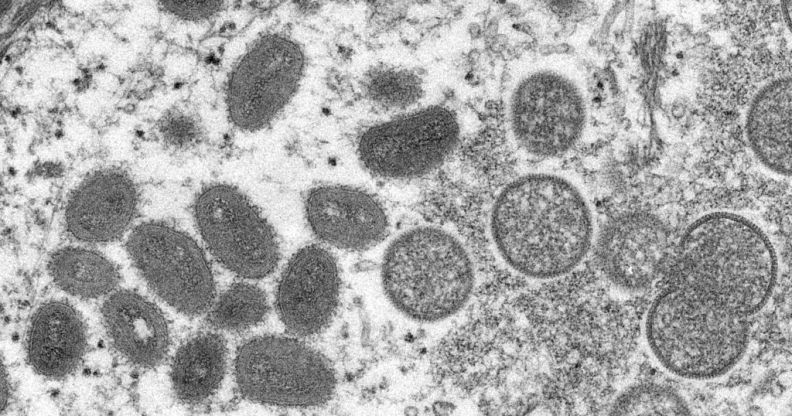Monkeypox: Public health risk level raised by World Health Organization as situation ‘evolves rapidly’

Microscope image of the monkeypox virus. (Getty/ Gado/ Smith Collection)
The World Health Organization (WHO) has said that monkeypox now poses a “moderate” global health risk, which could increase to “high”.
The WHO had previously referred to the virus, which has now been detected in 21 non-endemic countries since the beginning of May, as being of “low risk to the general public”.
This has now been raised to moderate because of the spread of the virus, which is usually only seen in Central and West Africa but has been detected in countries across Europe, North America and Australia.
WHO said on 29 May that the “public health risk could become high if this virus exploits the opportunity to establish itself as a human pathogen and spreads to groups at higher risk of severe disease such as young children and immunosuppressed persons”.
It added: “Currently, the overall public health risk at global level is assessed as moderate considering this is the first time that monkeypox cases and clusters are reported concurrently in widely disparate WHO geographical areas.”
“Additionally, the sudden appearance and wide geographic scope of many sporadic cases indicates that widespread human-to-human transmission is already underway, and the virus may have been circulating unrecognised for several weeks or longer.”
WHO added: “The situation is evolving rapidly and WHO expects that there will be more cases identified as surveillance expands in non-endemic countries, as well as in countries known to be endemic who have not recently been reporting cases.”
Countries, including the UK, have begun stockpiling smallpox vaccines which have proved effective against monkeypox, as the viruses are so similar.
However, WHO noted that “a large part of the population is vulnerable to monkeypox virus, as smallpox vaccination, which confers some cross-protection, has been discontinued since 1980 or earlier in some countries”.
There are now 257 confirmed cases outside of Central and West Africa, with 127 suspected cases under investigation.
The majority of these cases have been detected in Europe, with more than 100 confirmed monkeypox cases in the UK alone, and queer men have been disproportionately affected.
However, the WHO said “the number of cases currently being reported is likely to be an underestimate”, due to the virus’s often mild symptoms, as well as a lack of diagnostic tests and clinical awareness in healthcare settings in countries where the monkeypox is new.
Early symptoms of monkeypox are flu-like, including fever, headaches, swelling, aching muscles and exhaustion. Rashes, lesions or spots may start to appear on the face, hands, and feet, before forming a scab which falls off.
The virus can be passed from person to person through close contact especially with lesions, body fluids, respiratory droplets and contaminated materials such as bedding and towels.

